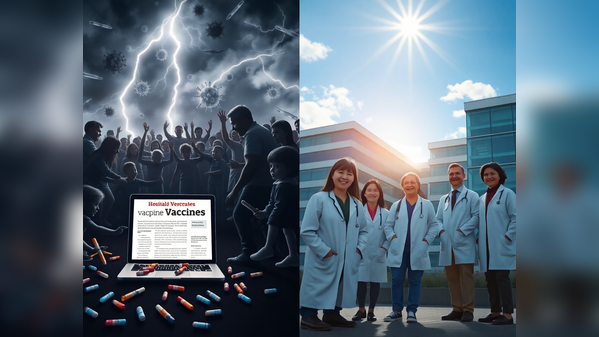Vaccines don’t cause autism. What does? experts say answers are far more complex.

23-Nov-2024 04:57 AM
Despite the resurgence of false claims linking autism to childhood vaccinations—promoted by figures like Robert F. Kennedy Jr.—scientists agree: vaccines are not to blame. So, what is? The causes of autism are far more intricate, with evidence pointing to genetics, prenatal factors, and environmental exposures, but no single culprit.
Debunking the Vaccine Myth The myth that vaccines cause autism , first popularized by a now-discredited 1998 study, continues to take root among certain segments of the population. RFK Jr., a prominent anti-vaccine advocate, has amplified this unfounded claim, linking the rise in autism diagnoses to vaccinations. However, research has thoroughly debunked this theory, showing that vaccines are safe and effective. Hundreds of studies have confirmed vaccines don’t cause autism, and the World Health Organization reports that immunizations have saved 154 million lives over the past 50 years. Despite this, Kennedy’s claims persist, especially in light of his recent selection by President-elect Donald Trump to head the Department of Health and Human Services (HHS), which oversees vaccine policy and autism research . Why Autism Diagnoses Have Risen Why Autism Diagnoses Have Risen The sharp increase in autism diagnoses—once estimated at 1 in 150 children in 2000, now 1 in 36—is often attributed to factors other than vaccines. Experts point to several key reasons for this surge: As Ari Ne’eman, co-founder of the Autistic Self Advocacy Network, explained, the anti-vaccine movement exploits vulnerable families and markets ineffective, dangerous treatments. “More discredited conspiracy theories linking autism and vaccines are not the answer,” Ne’eman said. Conspiracy Theories and the Search for Simpler Answers Conspiracy Theories and the Search for Simpler Answers Timothy Caulfield, a leading researcher on health misinformation, argues that the complexity of autism's origins makes it a prime target for conspiracy theories. Unlike conditions with clear-cut causes, such as Down syndrome, which is caused by a genetic mutation (an extra copy of chromosome 21), autism’s root causes remain elusive. “Autism’s complexity makes it more susceptible to myths and speculations,” Caulfield said. But, as Judith Miller, a clinical psychologist, noted, “Every hour spent debunking myths is an hour lost that could be spent helping families.” The Genetic and Environmental Puzzle Autism is not a one-size-fits-all condition. Experts like Manish Arora, professor of environmental medical and climate science, stress that autism is a spectrum disorder. This means it encompasses a wide range of traits, from mild to severe, and may manifest in various ways for different individuals. Genetics are known to play a major role in autism, with studies showing a 60-80% genetic contribution. Identical twins are more likely to both be diagnosed with autism, suggesting a strong hereditary link. Yet, there’s no single gene responsible for the condition. Instead, hundreds of genes have been implicated, though none are always associated with autism. “Genetics has never been clearer,” said Dr. Gregory Cejas, medical director of the Autism Clinical Center at Washington University. But even so, genetic factors alone don’t account for all autism cases. Parenatal and Environmental Risk Factors Parenatal and Environmental Risk Factors While genetics is crucial, environmental factors also play a significant role in the development of autism. Prenatal exposures—such as maternal infections (flu, pneumonia), high levels of air pollution, and complications during birth—have been linked to a higher risk of autism in children. For example, babies born prematurely or those who experience complications like umbilical cord entanglement may face a higher risk. There is also evidence suggesting that older parental age could increase the risk of autism, though the exact reasons remain unclear. While no one factor causes autism, the combination of genetic vulnerability and environmental exposures likely increases the chances of developing autism. However, as Catherine Lord, a UCLA autism researcher, said: "The one thing we know doesn’t cause autism is vaccines." The Need for a Broader Research Agenda The Need for a Broader Research Agenda Despite the growing understanding of autism’s genetic and environmental factors, researchers acknowledge that there’s still much to learn. However, as Ari Ne’eman points out, current research priorities are often disconnected from the needs of autistic people and their families. “We need an autism research agenda that reflects the true priorities of autistic people,” Ne’eman said. Support services, rather than just genetic studies, should be a top focus, he argued, as only 8.4% of the U.S. autism research budget goes toward services for those affected by autism. The Takeaway: Vaccines Aren’t the Problem The real question for families and communities dealing with autism is not what caused it, but how to provide better support and services for people on the spectrum. While the causes of autism are complex and multifaceted, vaccines are not to blame. As we continue to unravel the complex web of genetic, prenatal, and environmental factors contributing to autism, it’s crucial to focus on evidence-based solutions—not discredited conspiracy theories that mislead and harm vulnerable families. Only then can we move forward with research and support systems that genuinely benefit those affected by autism.
- Increased awareness and screening: More children are being tested and diagnosed as awareness of the condition grows.
- Changing definitions: The criteria for what constitutes autism have broadened to include milder forms of the condition that may have previously been overlooked.
- Better diagnostic tools: Advances in medical technology have made it easier to identify autism at earlier stages.